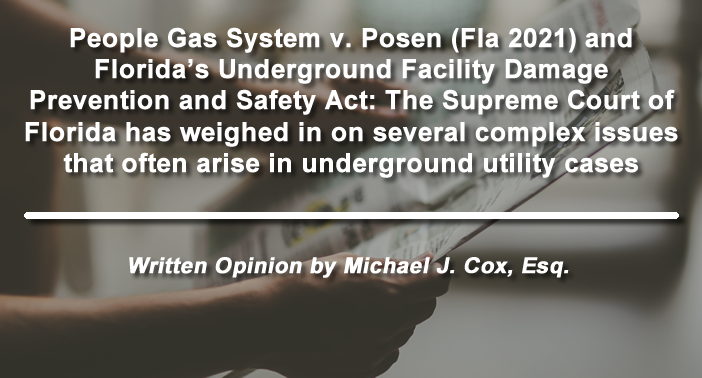It has been happening all around you for decades now and you might not have noticed. Utilities are increasing installed underground. In addition to sewer and water lines, cable, internet, and even electrical utilities are now run underground. Overall, underground utilities are thought to be safer and better able to withstand weather events, like hurricanes; however, with more and more utilities moving underground, the subterranean space in municipal areas has become increasingly chaotic, disorganized, and difficult to navigate. Utility strikes or hits, damage caused to another underground utility, are increasingly common. Not only are they more common, they are more often than not, extremely expensive events, involving high liability exposure. This exposure can include, notably so, substantial consequential damage: power, water, or internet outage or hazardous spills.
Florida’s Underground Facility Damage Prevention and Safety Act (“UFDPSA”), contained in Chapter 556, Florida Statutes, was enacted first in 1993 and amended substantively in 2002, and it attempted to create a uniform procedure for identifying underground utilities. At common law, there was no duty to mark underground utilities. UFDPSA superseded any common law on the subject, and at least one Florida appellate court, the Fourth District Court of Appeal, had to this point concluded that the statute, where applicable, precludes other common law claims. See Martin v. Fla. Power & Light Co., 909 So. 2d 555, 558 (Fla. 4th DCA 2005) (holding UFDPSA preempts negligence actions in Florida). Attempting uniformity throughout the State, Florida’s Legislature intended to preempt local requirements too, which was apparent right from the language of the statute, “[…] Municipalities, counties, districts, or other local governments may not adopt or enforce ordinances or rules that conflict with this chapter [556] or that prescribe any of the following: (1.) Require operators of underground facilities to obtain permits from local governments in order to identify underground facilities; (2) Require pre-marking or marking; (3) Specify the types of paint or other marking devices that are used to identify underground facilities; and (3). Require removal of marks.” Fla. Stat. § 556.101(3)(d).
Practically speaking, utility companies and underground boring and roadway construction contractors know UFDPSA for its creation of Sunshine State One-Call of Florida, Inc., a non-profit created to coordinate underground excavation work and to administer the reporting requirements of the Act. One–Call was supposed to eliminate the need for excavating persons or contractors to contact each utility individually to determine the existence of underground utilities. Under Chapter 556, excavators are required to provide notice of excavation and/or demolition work, within a specific time period of the work, and to provide specific details about the job. A failure to comply with the requirements of the statute creates a rebuttable presumption of negligence, a statutory-presumption. Intentional violations of the Act can also result civil penalties. This means that, briefly, if a contractor is involved in a strike event, they must be ready to confront the prospect of both civil and administrative actions.
Utility members are now, since 2006, required to participate in the notification, On-Call, system. Often, contractors misunderstand that complying with the One-Call system perfectly does not necessarily protect the contractor from liability, if a strike event occurs, even where the utility member might have been negligent in locating its utilities. In fact, where the notice procedures were not followed strictly, Florida Courts have determined that the utility member may not have had any duty to mark its utilities.
Helping to clarify these complex issues, the Supreme Court of Florida has now jumped firmly into the interpretation of Florida’s Underground Facility Damage Prevention and Safety Action with its recent decision, in Peoples Gas Sys. v. Posen Constr., Inc., No. SC19-1305, 2021 WL 2371262 (Fla. June 10, 2021), reh’g denied, No. SC19-1305, 2021 WL 3630299 (Fla. Aug. 17, 2021). With this decision, although still nonfinal, the Court has importantly held that (1) UFDPSA implicitly created a standalone negligence-type action, which also means a recognition for application of Florida’s comparative fault statute, (2) that UFDPSA does not create “statutory indemnity,” (3) there exists a proximate causation element under the statute, and (4) a party may broadly recover pure economic loss, independent of personal injury or property damage.
The Court took up these issues on a certified question from the federal court, the U.S. Court of Appeal for the Eleventh Circuit, which specifically asked: “Whether a member-operator has a cause of action under Fla. Stat. § 556.106(2)(a)-(c) to recover damages (or obtain indemnification) from an excavator for payments to a third party for personal injuries related to the excavator’s alleged violation of the statute?” The federal court case arose from a 2010 strike-incident, where a Posen employee ruptured a PGS pipeline during excavation work, which caused an explosion that left the employee severely injured. The Parties disputed that adequacy of Posen’s notice of its excavation work. The injured employee sued both entities but that suit resolved with PGS settling the claims. Thereafter, PGS sued Posen in federal court, essentially attempting to subrogate its losses in the settlement to the Posen employee. PGS’ suit was initially dismissed, reasoning that Posen had no duty to indemnify PGS under UFDPSA.
The Supreme Court of Florida acknowledged that UFDPSA does not, by its specific language, expressly crease a cause of action, certainly not one for statutory indemnity; however, understandably so, noted that the duties prescribed by the statute create legal duties on those it governs. Thus, considering its superseding of the common law, UFDPSA’s obligations implicitly create a negligence-type of action, wherein the legal duties of the statute should be applied akin to a standard of care.
With its holdings, the Supreme Court of Florida specifically recognized that UFDPSA imposed legal duties on both the utility members and excavators. As it pertains to the excavator, these are very specific duties concerning actual performance of the work and, failure to follow the requirements, is likely to create liability for damages incurred. Importantly so, the Court recognized that, even after the excavator complies perfectly with the statutes advanced notice requirements, UFDPSA still requires the work be performed “in a careful and prudent manner, based on accepted engineering and construction practices.” Peoples Gas Sys. v2021 WL 2371262, (quoting Fla. Stat. § 556.106(2)(c)). This is, as the Court explains, essentially a negligence standard of care. As I have more than once pointed out to clients involved in these cases, this means that your strict compliance in reporting to One-Call—Sunshine 811—does not itself protect you from liability nor does the utility member’s purported failure to comply with their obligations. This scheme, as the Court implicitly recognizes, strongly favors the utility member (or even third-parties injured consequently), not the excavating contractor.
Even so, the decision in Peoples Gas Sys. is particularly important because it does not simply apply UFDPSA’s duties within the context of a statutory indemnity. In other words, UFDPSA “does not purport to make an excavator solely liable for all damage or injury resulting from an excavation or demolition, no matter what” as the Court states specifically. This is particularly important for the excavator contractor who has arguably caused the strike event because, in general terms, it means you have a fighting-chance, a plaintiff has a burden of proof and the excavator is likely to have more meaningful defenses, particularly comparative fault. This also creates serious tactical consideration to weigh when deciding whether to file suit or wait to defend a suit.
Despite the Court’s work in Peoples Gas Sys., the language of UFDPSA remains quite nebulous (for instance, an excavators’ obligation, in certain circumstances “to use increased caution” Fla. Stat. § 556.105(5)(c)) and will eventually result in significant future litigation. This also means that, almost regardless of the circumstances, this type of case will be difficult to dispose of in any dispositive motion practice. From a legal standpoint, the law is still catching up to reality, and our clients in this industry often struggle with the complex and high-risk environments inherent with this type of claim. In part, this is an underdeveloped body of law, many contractors in the industry misunderstand legal protections they incorrectly believe exist, and fail to appreciate the complexity of the evidentiary burdens and limitations of these cases. In most instances, contractors involved in a possible utility strike do not, at that time, appreciate how to fully document the scene and how to protect themselves proactively. Selecting experienced counsel is critical when dealing with underground utility work and strike-events. Our construction team at Taylor Day is here to assist you in these and other complex construction matters.


